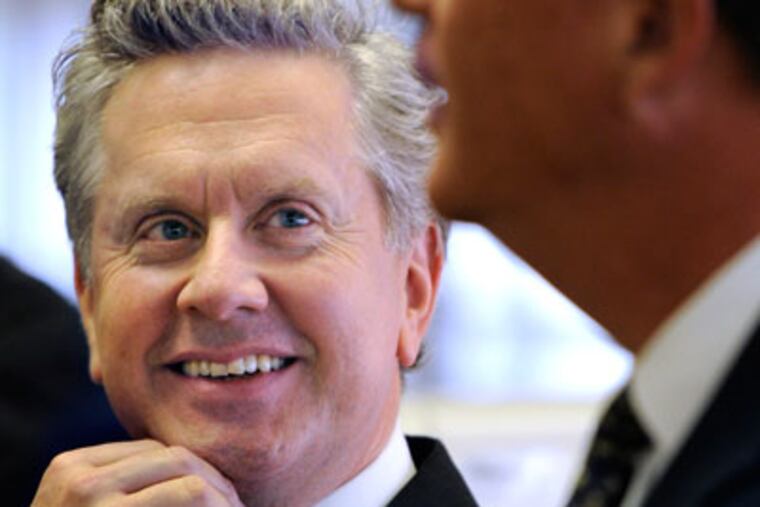Catholic school foundation's new chief starts his job by talking with students
On his first day as chief executive of the foundation that is running high schools and special-education schools for the Archdiocese of Philadelphia, Samuel Casey Carter toured SS. John Neumann and Maria Goretti Catholic High School, speaking to students and observing some new technology-enabled classrooms.

On his first day as chief executive of the foundation that is running high schools and special-education schools for the Archdiocese of Philadelphia, Samuel Casey Carter toured SS. John Neumann and Maria Goretti Catholic High School, speaking to students and observing some new technology-enabled classrooms.
In one room, seniors from an Advanced Placement calculus class used iPads to map derivative functions - anyone remember how to solve f(x) = (x+3)7? In another, students wore heart-rate monitors while playing fitness games on a Wii video-game console.
Carter, an education manager and consultant who has written about data use in schools, said technology could boost student engagement and accommodate different learning styles.
"The story here is not just 'Casey Carter comes to Philadelphia to help grow enrollment and raise money,' " he said Monday. "We're really, deeply interested in personalized learning, technology in the classroom, and how technology can really improve education offerings in schools."
Carter, who has experience with Catholic and charter schools, was chosen to helm the Faith in the Future Foundation after an extensive nationwide search, said foundation chairman H. Edward Hanway. The foundation was created this year to garner financial support for Catholic schools, raise their visibility, and increase enrollment.
The archdiocese announced in August that it had turned over management of the 17 archdiocesan high schools and four special-education schools to the foundation.
"We wanted someone who was a demonstrated leader, who understands the challenge of K-12 education, particularly Catholic education," Hanway said.
He said Carter - who goes by Casey - was one of at least three finalists who emerged from a field of 10 national candidates, who were identified with the help of a search firm.
Hanway said the foundation was especially interested in finding a top administrator who could develop a clear vision and articulate a persuasive strategy to help the schools grow.
"Casey has the right mix of strategic ability and experience with practical applications," Hanway said. "That's why the search committee felt he would be an outstanding choice."
He declined to reveal Carter's salary.
Carter has been living just outside Washington, where he is president of Carter Research, an education consulting firm. He said he, his wife, and three daughters would relocate to Philadelphia.
The new CEO said he was excited to be involved in Philadelphia's groundbreaking effort with the foundation to bolster and advance Catholic schools.
"I do believe what we do here will become a national model that others will replicate," said Carter, 46, a Pittsburgh native.
He already had what he said was an inspiring meeting recently with Archbishop Charles J. Chaput. He plans to immediately embark on what he has dubbed his listening tour. He intends to visit all the archdiocesan high schools and special-education schools by Thanksgiving.
On Monday, he started with a handful of freshmen in the library of Neumann-Goretti. Carter appeared comfortable with the students, joking with them and gently prodding them to think about the school and their place in it.
"Yeah, I like it here," said Vanessa Messina, 14. "I guess the school makes you feel ... I don't know, like you're wanted."
"I think that's profound," Carter told her. "I mean, if you're wanted at your school, if you feel comfortable and safe here, maybe you'll risk doing some more difficult things than you would do otherwise. Does that sound right?" The students around the table nodded.
The resumé for Carter's extensive career includes serving as president from 2005 to 2007 of National Heritage Academies. The Michigan-based education management firm operates 76 elementary charter schools in nine states. None is in Pennsylvania.
"I've spent most of my career discovering what works in the education of the young," he said, "and working with others to replicate it."
As a consultant, Carter has worked with officials at the Cristo Rey Network, which operates private Catholic high schools for low-income students in 17 states and Washington. Cristo Rey Philadelphia High School opened in the city in August.
Carter said he also had worked with KIPP, a national nonprofit network of charter schools that specializes in college-prep instruction for low-income students. KIPP Philadelphia has four charters.
He also cowrote a study, "Data Backpacks: Portable Records and Learner Profiles," that is slated for publication Tuesday through Digital Learning Now, an initiative cochaired by former Govs. Jeb Bush (R., Fla.) and Bob Wise (D., W. Va.).
As a Bradley Fellow at the Heritage Foundation, a conservative think tank, Carter wrote a well-known work the foundation published in 2000 titled No Excuses: Lessons from 21 High-Performing, High-Poverty Schools.
Adam Meyerson, now president of the Philanthropy Roundtable in Washington, said Carter wrote the volume under his direction.
Meyerson called it "a highly influential and inspiring book" that showed that there were public, charter, and religious schools across the nation where children of all races and income levels were meeting high expectations and that these successful models could be replicated.
He said Carter's new position in Philadelphia would enable him to apply to Catholic schools some of the management lessons that charter organizations have discovered.
Carter earned his high school diploma from Portsmouth Abbey, a New England boarding school operated by Benedictine monks. He earned his undergraduate degree from St. John's College in Annapolis, Md. He studied theology at Oxford University and earned a master's degree in philosophy from the Catholic University of America.
at 215-854-2789 or martha.woodall@phillynews.com. Contact Jessica Parks